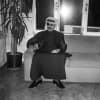Each Tuesday, FADER editor Matthew Schnipper highlights an underappreciated recent release he thinks we need to know about. This week it’s Gang Gang Dance’s Saint Dymphna. Listen to the album's "Princes," buy the album and read Schnipper’s thoughts on it after the jump.
Last night I bought cookies and watched The Wanted with my friend Sunny, who came over so she could use the TV. Her friend Adam worked on the show and she was proud of him. It sounds like a heavy job, traveling to Rwanda and Norway tracking down war criminals living the high life with no imminent threat of capture or imprisonment from any nation. Last night’s premiere episode introduced the reality show/journalism hybrid and was total terrible garbage. They went to Oslo to "track down" Mullah Krekar, who then tells the host, a former Green Beret, that he deserved to die when he was on the streets of Baghdad, but neglected to say that he frequently speaks to American journalists and that most likely the stakeout was an unnecessary, NBC-generated—he'd emailed them and openly invited them to his home after they sat in a van with tinted windows and filmed his apartment complex. For all its plethora of inappropriate meddling (not to mention the bizarre choice to leave the dudes on the show completely unstyled while being so meticulous about all of the other details), The Wanted seemed a dubious idea—a queasy one, really. But maybe they feel like it’s their job to interfere, even if it is with an unsteady moral. During the show, I thought of Gang Gang Dance’s song “Afoot,” from their album Saint Dymphna. McDonald’s cashiers in a land where cows are sacred Lizzi Bougatsos sings. It’s not a pretty lyric, though a genuine disturbance. But that blunt queasiness was missing from The Wanted, the idea that some things you should not touch. Please, you do not belong there NBC reality show and it is doing more ambient harm than tangible help, please go away.
The second to last song on Saint Dymphna is “Desert Storm,” named after a war that took place in the Middle East the same time Mullah Krekar left Iraq for Norway. At least you were near me is Bougastsos’ most simple, poignant line in that song. Though the rest of the song’s lyrics leave its meaning as being obliquely about another person, that “we” is just as poignant when thinking about place. In this Washington Post article about Roger Carstens, The Wanted’s Green Beret, it quotes him on the show as agreeing, meta, to be a character after asking, “The bottom line: We are going to do our own work on the ground?” Though it's possible or likely that this line was scripted, its essence is the fulfillment Bougatsos' desire line is wishing. The story trails Carstens as he screens the show for the military, his past and present brethren whose positive opinion he clearly hinges The Wanted on. They of course are wild about the show and he exhales with great pride and relief. Watching the show, that need for purpose in creating global goodness, manufactured or otherwise, is clear within the men—that this exists to snuff out something personal. Not to rally against the warmth that rages in the hearts of strong men, but The Wanted is more about enabling their desires than breaking down the evil behind the freedom of grotesque men.
And what of Gang Gang Dance? This was a forgotten album, toiled over for many years, just like the careers of The Wanted men (which includes an Emmy-winning journalist and a Navy SEAL). It is their most global album, the actualization of meshing their ever-loosening avant-heart with the neon pop of Moroccan restaurants and the silver flutes of Southeast Asia. Roto-toms simply belong in places other than the United States. The album’s back cover features a shrouded man playing electric guitar with a Marshall amp in a backpack. He’s dressed in what looks like traditional Tuareg clothing, like the Saharan musicians Gang Gang Dance surely listen to. I have no idea who he is. It could be a Halloween costume. Or it could be a African musician. Or maybe it is someone who lost their mind and thinks they look awesome throwing a zebra print guitar strap over the entire ensemble. It’s the ease and excitement of blending that is so soothing. That loose multi-culti jibing is so crucial to the rest of Saint Dymphna, though I think it is also responsible for some of the album’s initial warm reception and subsequent lack of fever. People love Gang Gang Dance, but this blending of flat brass, wooden percussion, UK grime, deep house and every other genre they inevitably bump in their shitty car stereos on long, boring tours, is so globally sporadic that it could appear to be leeching, when really it’s a harmonious fusion.
That is the difference between the spirits of Gang Gang Dance and The Wanted’s approach to varied nations, cautious anxiety versus curiosity. Halfway through the show, in Iraq, the camera pans to a very brief b-roll of a young man cracking dry earth with a pickaxe. The shot lasts briefly, no longer than two or three seconds, but it was comical in its lack of coherence within the narrative, local color grabbed for pastiche, not for a mellow integration.
